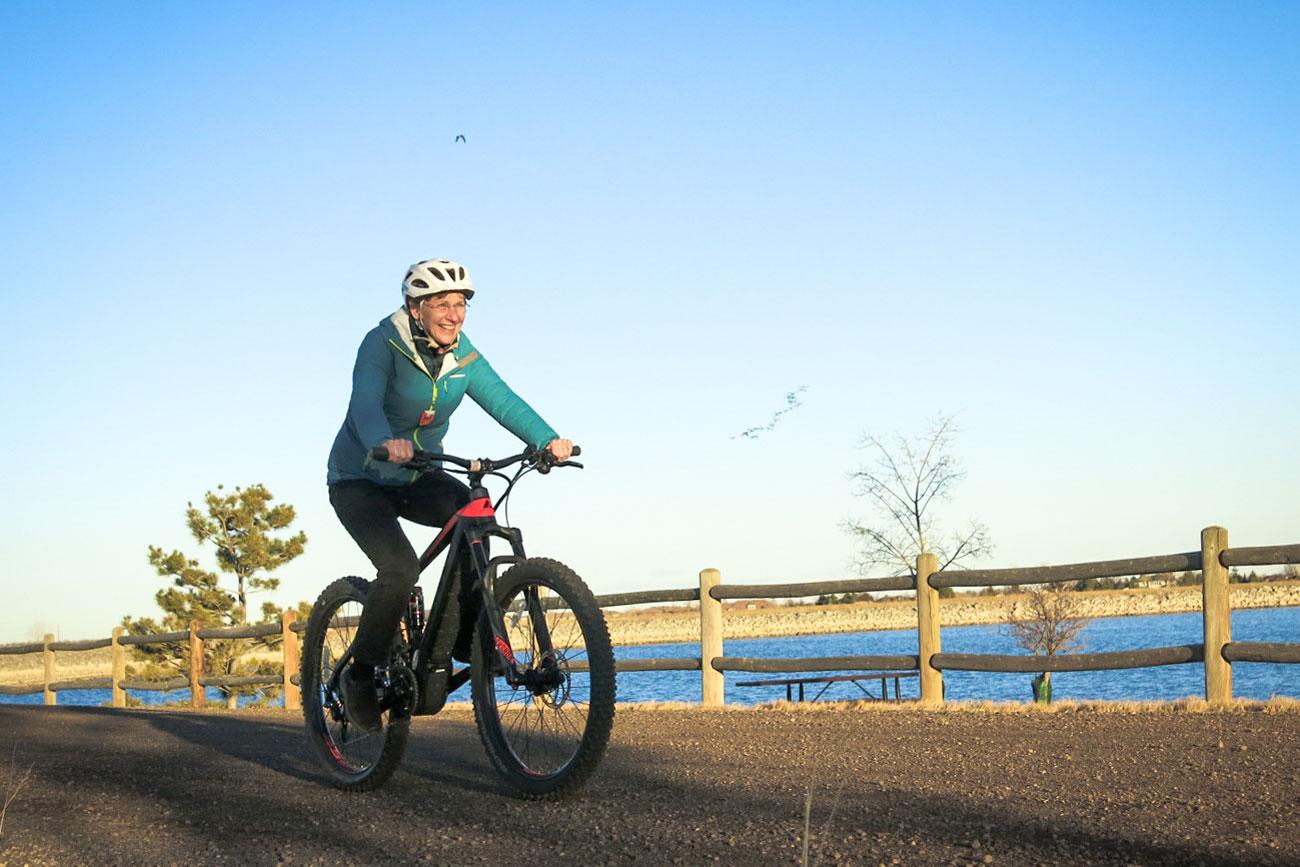

As more people move to Colorado’s Front Range, the trails that crisscross the outdoors have grown more crowded as well — stoking tensions between age-old rivals: bikers and hikers.
In turn, a few local governments are trying to get ahead of an expected surge in electric bike activity. This too is unleashing a strong undercurrent of emotion.
“We called the category ‘general bike hate,’” said visitor services manager Mary Ann Bonnell with Jefferson County Open Space, which solicited public comments in 2017. “People, just in the opportunity to say something, would say things like, ‘I just don’t like sharing the trail with bikes in general.’”
Other, more leisurely-paced folks, weren’t too keen on the extra speed that cyclists display. One Facebook commenter posted on JeffCo Open Space’s page saying, “When I’m riding my horse on a trail I really, really don’t want a cyclist coming around a blind corner at us at 20 mph! No animal in the forest travels that fast.”
JeffCo intensively studied allowing e-bikes on trails. Now, Boulder County is crafting its own e-bike policies. Other places like Denver Mountain Parks and Colorado State Parks are expected to take on the issue in the coming years. It all comes after the Colorado state legislature codified what e-bikes are and where they can go.
“We wanted to leave it up to local control. That was our main focus in addition to making the industry work better,” said Republican state Rep. Yeulin Willett.
Quiet E-Bikes
In Boulder County, e-bike interest sparked an “overwhelming response” this winter, said Boulder County Ranger Erin Hartnett — more than 300 public comments. Some called e-bikes “dumbing down of exercise,” ”cheating” and “loud”. Others emphasized seniors’ rights over Boulder’s “mega athletes”.
One of the biggest sources of contention was allowing e-bikes on Boulder’s dirt trails where there are “bikers and hikers and runners and horseback riders all out there using the same trail system,” Hartnett said.
Horse rider Suzanne Webel of Longmont showed up at one of several open houses to take a ride and learn more. She rides her horses on trails near Longmont’s expansive Lagerman Agricultural preserve. Her mission was “to see if the horse would be afraid of them more than a regular bicycle.”
In fact, she learned that modern e-bikes are whisper quiet. Early electric bikes made a whining noise, but modern e-bikes emit no sound.
‘If You Can’t Detect It, Is It Really A Problem?’
To the south of Boulder County, in Jefferson County, open space officials there have decided to allow Class 1 e-bikes on dirt trails where mountain bikes are allowed. Class 1 and 2 e-bikes will be allowed on paved trails within parks.
The decision comes after a year of intensive research in JeffCo where Mary Ann Bonnell did something unusual. She wanted to study public opinions on e-bike, but she also wanted to test what people actually knew about them. To find out, she organized volunteers to stop hikers and log their opinions. She also recruited a few of the nearly silent e-bikes to ride by on the same trails past the visitors.

“Here’s this person who’s decided this thing is really a bad idea, and yet can’t recognize it when it’s right in front of them,” Bonnell said.
She found that some people who can’t recognize an e-bike can sometimes be dead set against them. Which was certainly interesting she said, “If you can’t detect it, is it really a problem?”
Public reaction on JeffCo’s Facebook page has been strongly divided. “Why don't we throw our tax dollars in a fire pit and light it first?” quipped one commenter. “This could potentially give the ability back to my wife to ride with me again,” another said.
JeffCo rangers and the rest of the open space team will closely monitor feedback throughout the year, Bonnell said. They’ll also keep a close eye on any potential damage e-bikes may cause to the trails.
Mountain Bikers Are Tip-Toeing Their Support
Just as hikers have thoughts on e-bikes, you won’t be surprised that bikers have them as well. The extra weight and torque that e-bikes have is a point of concern to mountain biking advocates like Gary Moore, who heads up the Colorado Mountain Bike Association. Moore is advocating for more research like the effort in Jefferson County.
“There is so much that we don’t know yet,” he said. “There’s still studies being done of the effects of these bikes on the trail systems. And on other users and on surrounding animals and wildlife.”
Moore and his association are proceeding with caution. The International Mountain Biking Association softened its stance toward e-bikes in 2017 after years of categorizing them as motor vehicles: “When the responsible land management agency, in consultation with local mountain bikers, deem such eMTB access is appropriate and will not cause any loss of access to non-motorized bikes,” their statement said.
The softening sparked a social media backlash. A few donors even cancelled their memberships.
Ultimately, Moore said the goal in Colorado is to not lose any of the gains his community has made.
“Mountain biking is still the red-headed stepchild of natural surface trails,” he said. “We’ve worked long and hard for the better part of the last 30 years to gain access to areas that other trail users are already using. And we don’t want to do anything to jeopardize that.”









